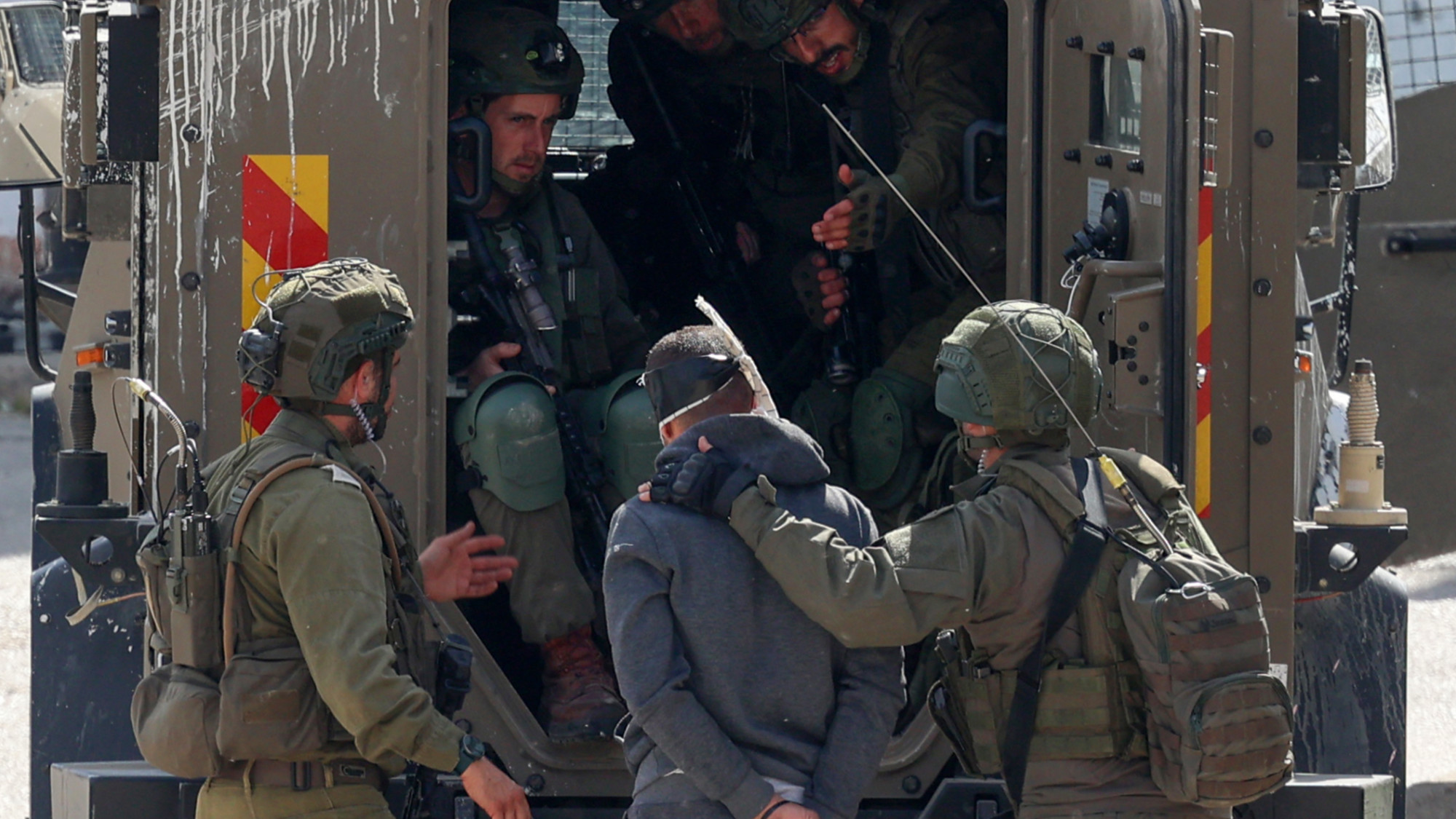Israel rearrests Palestinians freed in latest exchange deal with Hamas

The Israeli army re-arrested seven Palestinians on Thursday across the occupied West Bank, all of whom had been released as part of the most recent prisoner exchange deal with Hamas in February.
Six of the prisoners were detained in Qalqilya, with the seventh apprehended in Ramallah.
They were taken to undisclosed locations, and neither their whereabouts nor the circumstances of their detention have been made public.
In recent months, Israeli soldiers have re-arrested 13 Palestinians previously freed under the February agreement.
Seven remain in custody, including one woman, while six have been placed under administrative detention - a controversial Israeli practice whereby individuals are held without charge or trial, with the possibility of indefinite renewal.
New MEE newsletter: Jerusalem Dispatch
Sign up to get the latest insights and analysis on Israel-Palestine, alongside Turkey Unpacked and other MEE newsletters
In Qalqilya, several Israeli military vehicles stormed the city at dawn, raiding the homes of recently released Palestinian prisoners.
Among those re-arrested was Saed al-Fayed, 51, who had spent 23 years in Israeli prisons and was freed as part of the recent prisoner exchange deal.
His son, Issa al-Fayed, told Middle East Eye that soldiers entered the house, called his father by name, handcuffed him, and took him away without providing any explanation for the arrest.
"It was a shock to us. We didn’t expect him to be arrested so soon," he said.
"We hope this is a temporary detention, but we also fear he’ll be placed under administrative detention, as has happened with several others released in the deal."
Violating the agreement
In January, Israel and Hamas reached a Gaza ceasefire agreement that included a prisoner swap. Hamas released 25 living Israelis and the bodies of eight others from Gaza, in exchange for Israel freeing around 1,900 Palestinians.
Under the terms of the deal - which Israel later reneged on when it resumed air strikes on Gaza - the released Palestinians were not to be re-arrested on the same charges for which they had previously been imprisoned.
'There are supposed to be international guarantees, but under occupation, there are none'
- Abdul Rahman al-Qatawi, Palestinian citizen
“There is no international law preventing the Israeli occupation from re-arresting released prisoners,” added al-Fayed, who believes his father was taken to the Israeli military’s Tzofim camp.
In the town of Birzeit, north of Ramallah, Israeli forces raided the home of Salama al-Qatawi, another Palestinian released under the agreement. He was at the hospital with his brother at the time.
His other brother, Abdul Rahman al-Qatawi, told MEE that soldiers searched the house, gathered the family in one room, and demanded they call Salama to return home.
"After they contacted him, he arrived by car. The soldiers pulled him from the vehicle, handcuffed him, and took him to a military vehicle. They then thoroughly searched his car," Qatawi said.
This marks the fifth time soldiers have raided the al-Qatawi family home since Salama’s release in February. On each occasion, he was threatened with re-arrest and placed under surveillance.
Salama had been planning to marry and resume work in the engineering field he had studied. His family expressed shock at how quickly he was re-arrested.
"There are supposed to be international guarantees, but under occupation, there are none. We fear he will be placed under administrative detention," Qatawi added.
‘A message to released prisoners’
According to Amani Sarahneh, spokesperson for the Palestinian Prisoners' Club, the latest arrests are part of Israel’s escalating campaign to target prisoners released under the recent exchange agreement.
Sarahneh told MEE that this forms part of a systematic policy and represents a clear violation of the deal.
"This is a new message to all released prisoners: they will remain under threat and persecution," she said.
Sarahneh added that such arrests are part of longstanding Israeli practices against former prisoners, but have become particularly pronounced in the case of those re-arrested after the 2011 Shalit deal.
In 2014, Israel re-arrested 40 Palestinians who had been released in the 2011 exchange deal for Israeli soldier Gilad Shalit, who was taken prisoner by Hamas.
Many of them had their long-term sentences reinstated, which was seen as a violation of the agreement.
"Israel has institutionalised the targeting of released prisoners through various means, including military orders, laws, and proposed legislation that have expanded the legal framework for their re-prosecution."
She also noted that the most recent prisoner exchange saw a marked escalation in such tactics.
"In the last deal, the targeting rose to the level of organised terror operations carried out against prisoners up to the moment of their release. Many were subjected to severe beatings beforehand,” she said.
“The pressure continued after their release not only on them, but also on their families, who have faced ongoing threats to this day.”
There are currently more than 10,000 Palestinian political prisoners held in Israeli jails, including 3,577 under administrative detention, 400 children, and 35 women, according to Addameer, a Palestinian human rights organisation monitoring prisoners’ affairs.
This figure does not include the thousands of Palestinians abducted from the Gaza Strip during Israel’s ongoing invasion.
middleeasteye.net